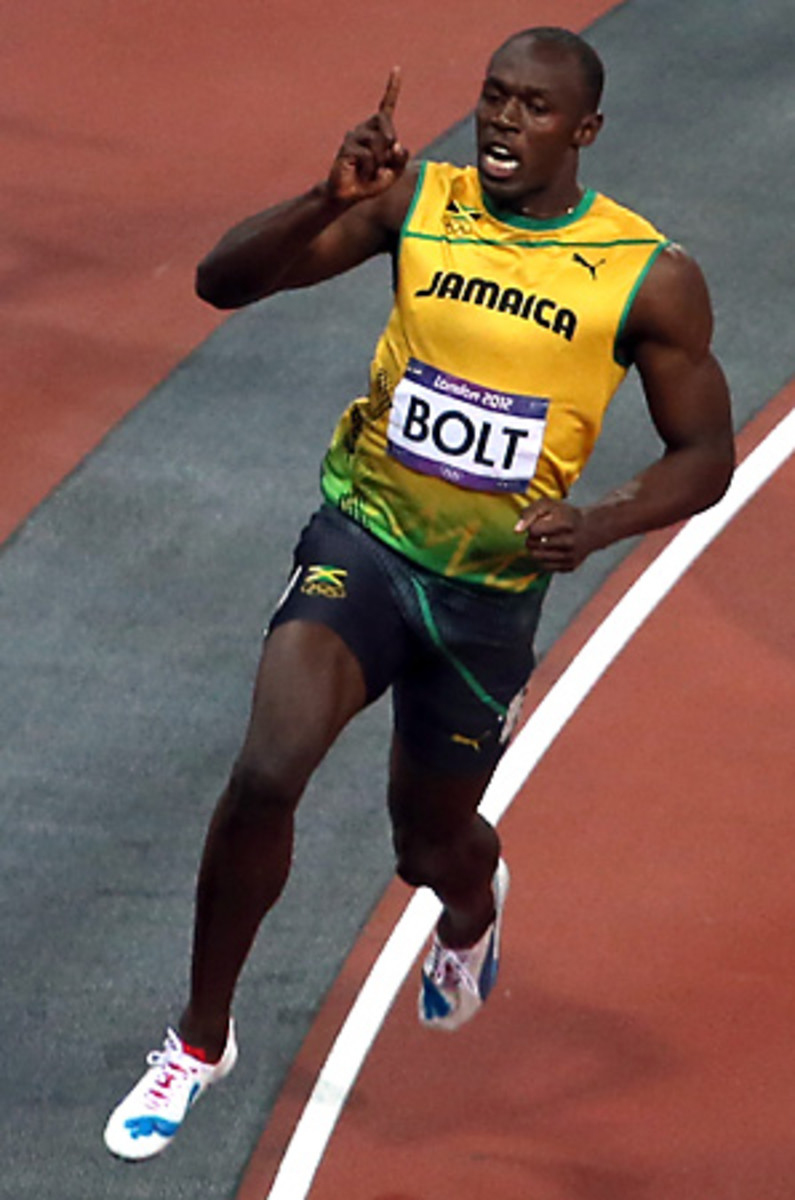Bolt shows he's still the man to beat, plus more Sunday thoughts
1. Usain Bolt turned back the clock to defend his title. Bolt posted an Olympic record 9.63 to become the first man since Carl Lewis to win two straight Olympic 100-meter titles. It was a fast final all around, the fastest times ever by recorded by third-, fourth- and fifth-place finishers, according to the Olympic Stadium announcer. But Bolt's speed was shocking, and in a much different way than his breathtaking 2008 victory. He had to work for this title, passing bronze medalist Justin Gatlin at 50 meters and going hard through the finish to ensure victory by .12 over Yohan Blake. Since Beijing, Bolt had run better than 9.76 (legal) once -- his 9.58 world record at the 2009 world championships. He'd dealt with injuries, starting and false-starting problems and a loss of his invincibility. Some thought he'd never go sub-9.7 again. Maybe it was the Olympic stage that spurred the Jamaican, or maybe it was the competition. Many tabbed training partner Blake the man to beat in this final, especially after Blake beat Bolt in the Jamaican trials. Blake equaled his personal best in but wasn't in Bolt's class. 2004 Olympic champion Gatlin, back from a four-year doping ban, ran a personal-best 9.79 (Gatlin had run a 9.77 in 2006, but that was wiped out with the ban) for third. Tyson Gay, in, remarkably, his first career Olympic final, just missed the medals with a 9.80. In any other Olympics, Gay would have medaled with that time. Nearly from top to bottom, this was the fastest Olympic final ever. I say nearly because Asafa Powell slowed to an 11.99 for last place, continuing his string of forgettable Olympic sprints. The other seven men went under 10 seconds. Powell's all but done as a major-championship contender, but Bolt, 25, showed he's not slowing down yet. Look for him to repeat again in the 200 meters, where he's a clearer favorite over Blake. We'll see them back on the track in heats Tuesday.
2. Sanya Richards-Ross had enough left in the tank to win the 400, the U.S.' first gold medal at Olympic Stadium. At 100 meters, I had flashbacks to the Beijing 400. In Lane 6, Richards-Ross had just about made up the stagger on the woman in Lane 7, reigning world champion Amantle Montsho of Botswana. It was clear Richards-Ross had gone out hard -- not out of the ordinary for her -- but it was the kind of aggressiveness over the first 300 meters in 2008 that cost Richards-Ross in the final stretch, where she faded badly to bronze. She didn't make that mistake this time, appearing to ease up a bit on the back stretch. Richards-Ross didn't overtake Montsho until about 300 meters (while being passed momentarily by Russian Antonina Krivoshapka). A familiar site appeared in the final 30 meters, Great Britain's Christine Ohuruogu closing quickly, just as she did to win the Olympic title in 2008. Richards-Ross (49.55) held her off this time by .15 to win her first individual Olympic gold medal in her third try. She was sixth in Athens eight years ago. Also in that Athens final was an American by the name of DeeDee Trotter. Trotter was the surprise bronze medalist Sunday night. She took fifth in 2004, failed to make the 2008 Olympic final and then went underwent major knee surgery and missed the 2009 season. At 27, her elite career appeared to be over. But Trotter fought back and was runner-up to Richards-Ross at the Olympic trials. Trotter's 49.72 marked the second fastest time of her career, her best in five years. As for Richards-Ross, she won't get much rest. Her first-round heat in the 200 is Monday morning. The last woman to double in the 200 and 400 was France's long-limbed Marie-Jose Perec in 1996.
3. Multiple U.S. streaks were snapped in the men's 400. No Americans made it through Sunday's semifinals and into Monday's final. Defending Olympic champion LaShawn Merritt pulled up with a reaggravation of a left hamstring injury in his qualifying heat Saturday. His two young teammates, Bryshon Nellum and Tony McQuay, bowed out in the semis. Nellum, who was shot while in college at USC, was close. He placed ninth overall over three semis and missed out on the eighth and last spot in the final by .03 seconds. When reigning world champion Kirani James of Grenada and the rest of the finalists cross the finish line Monday, it will mark the first time since 1980 a non-American wins the one-lap sprint. It's also the first time ever that the final will not include a U.S. man. In all but two Olympics, one being the boycotted 1980 Games, the U.S. has had at least two finalists in the 400. Sure, Merritt would have been a gold-medal contender (favorite?) had he not suffered the hamstring injury in Monaco two weeks ago. Nobody in the semis ran within four tenths of Merritt's world-leading time from trials. But, the presence of James and Belgian brothers Jonathan and Kevin Borlee shows just how global this event has become at the elite level.





